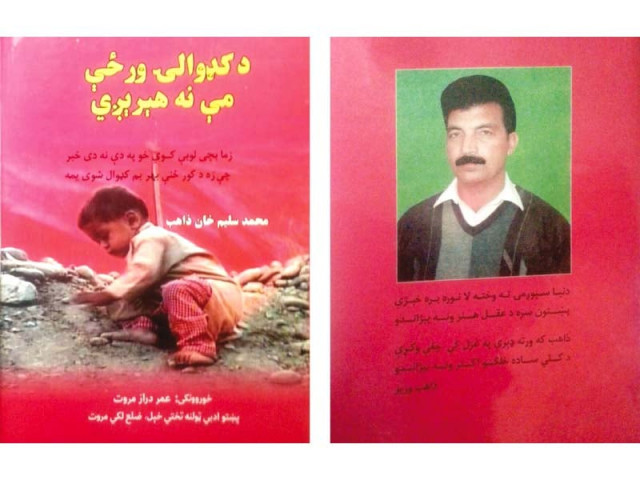Poignant moments: Weaving poetry from the plight of the displaced
Pashto poet from North Waziristan says he wants to republish his anthology

Cover of Muhammad Saleem Zahib’s book. PHOTO: EXPRESS
The book paints a realistic picture of human lives torn by war and insurgency. It was released in April and is already out of stock in most stores. The demand for the anthology has surged. The poet intends to publish a new edition of the book even though he does not have the funds and resources to do so.
The 43-year-old poet from North Waziristan Agency unabashedly censures a society that has reduced the prospects of tribespeople and uses poetry as a medium to convey their misery and heartache.
A brave new world
“For the last 15 years, we have not been able to write anything that could come close to the works of great Romantic poets,” Saleem Zahib told The Express Tribune on Saturday. “[Every time we put pen to paper], we elucidate the struggles of our people.”
He said continuous wars in the tribal belt have compelled thousands of people to leave their homes and to settle in IDP camps. Although some of them have been repatriated, most of them are still languishing in camps in the scorching summer heat. “A new word has come into existence – we are refugees in our own homeland,” Zahib said.
An IDP himself, the poet wrote about the harsh realities of camp life.
“I would pen down a series of facts about life at the camp while I was living in them,” he said. “However, my notebooks, along with clothes and other personal items have been left in the tribal area.”
Potency of poetry
Zahib has being writing poetry for the last three decades since a majority of the tribal areas have maintained a very close affiliation with poetry. “This is one of the main sources of catharsis for tribespeople,” he said. “Poetry is now one of the few sources through which people can explain their suffering.”
Important topics that cannot be spoken or written about find a voice through rhyme and meter.
“It is through poetry that an artist conveys his/her grievances to the world,” he said. According to Zahib, poets write about subjects that are embarrassing, poignant and even heart-breaking.
“Most of the conditions that are mentioned in the book may make people ashamed, but they need to be heard,” he said. Reciting one of his sonnets, Zahib read, “We are neither considered alive nor declared dead.”
Continuing the legacy
The author of Da kadwalai woraze me na kheregi said he has been inspired by the Pashto poets such as Qalandar Mohmand and Rahmat Shah Sail.
His poetry shows no marked departure from poetic practices of his contemporaries and earlier poets of the region. However, Zahib has focused on additional subjects.
Apart from romanticising nature, he is not hesitant to put a spotlight on growing class prejudices, class differences and other social disparities. Zahib, through satire, explores the exploitative effects of poverty, war and societal evils on the lives of tribespeople.
“If we look at history, Pukhtuns have always been oppressed which their development suffered,” the poet said. “We do not want bombs, tanks and jet fighters, but need schools, hospitals and freedom.”
Zahib lamented that most of this work is not accessible to people in the outside world.
He said, “While Pukhtuns have contributed immensely to literature and maintained the rich traditions of poetry sessions, most renowned artists and poets from the tribal belt are hardly recognised beyond their local circles.” He pinned the blame on the lack of exposure and poor communication and information systems of the country.
Zahib was in charge of the eye ward at District Headquarters Hospital Miram Shah in North Waziristan Agency.
Published in The Express Tribune, May 29th, 2016.













COMMENTS
Comments are moderated and generally will be posted if they are on-topic and not abusive.
For more information, please see our Comments FAQ